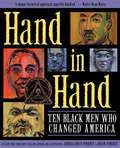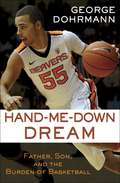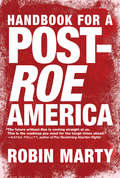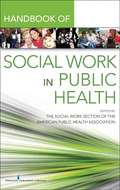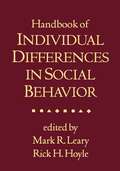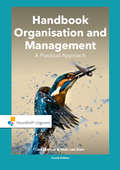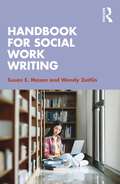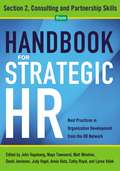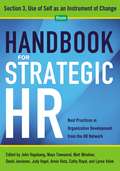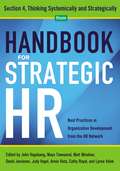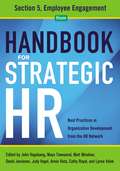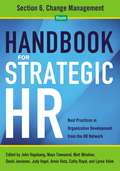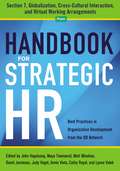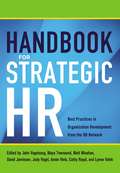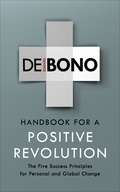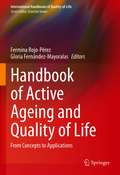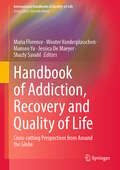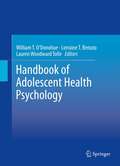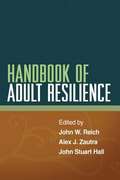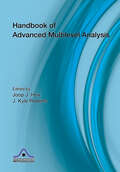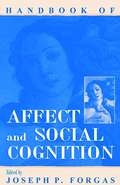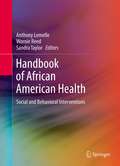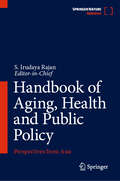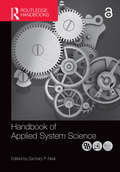- Table View
- List View
Hand in Hand: Ten Black Men Who Changed America
by Andrea Davis PinkneyThis book contains brief biographies of ten black men who greatly influenced American history and made a difference in the movement of anti-racism. <P><P>Winner of the Coretta Scott King Medal
Hand-Me-Down Dream (Essay): Father, Son, and the Burden of Basketball
by George DohrmannIn this eBook exclusive essay, Pulitzer Prize-winning sports journalist George Dohrmann follows a father and son separated by prison bars--but bonded by their pursuit of basketball glory. The dream of playing big-time basketball never came true for Bruce Nelson, so he passed it on to his son Roberto. His every waking moment as a father was devoted to securing Roberto a Division I scholarship. Oftentimes he worried that his son's lack of competitive fire might put that dream in jeopardy--when in fact it was Bruce's own actions that would do so. When Bruce is forced to monitor Roberto's progress from behind penitentiary walls, his influence recedes--and so too does Roberto's commitment to the aspirations they once shared. In a story that combines deep insight into family relationships with the deft storytelling that distinguished his award-winning Play Their Hearts Out, George Dohrmann follows Roberto as he addresses his life's most difficult decisions in the absence of his best friend and most constant companion. In doing so, Dohrmann sheds new light on the larger story of basketball dreams and the pressures they place on young athletes. Includes an excerpt from George Dohrmann's Play Their Hearts Out, winner of the PEN/ESPN Award for Literary Sportswriting and the Award for Excellence in the Coverage of Youth Sports. Praise for Play Their Hearts Out "Often heartbreaking, always riveting."--The New York Times Book Review "Tremendous."--The Plain Dealer "Indispensable."--The Wall Street Journal "A tour de force of reporting, filled with deft storytelling and vivid character studies."--The Washington Post "One of the finest sports books of all time."--Harper's Magazine "Amazing stuff . . . the Friday Night Lights of youth basketball."--Leigh Montville, author of The Big Bam "A landmark achievement in basketball journalism."--Kirkus Reviews (starred review) NAMED ONE OF THE BEST SPORTS BOOKS OF THE YEAR BY THE LOS ANGELES TIMES * THE CHRISTIAN SCIENCE MONITOR * KIRKUS REVIEWS
Handbook For A Post-Roe America
by Robin MartyHandbook for a Post-Roe America is a comprehensive and user-friendly manual for understanding and preparing for the looming changes to reproductive rights law, and getting the healthcare you need—by any means necessary. Activist and writer Robin Marty guides readers through various worst-case scenarios of a post-Roe America, and offers ways to fight back, including: how to acquire financial support, how to use existing networks and create new ones, and how to, when required, work outside existing legal systems. She details how to plan for your own emergencies, how to start organizing now, what to know about self-managed abortion care with pills and/or herbs, and how to avoid surveillance. The only guidebook of its kind, Handbook for a Post-Roe America includes an extensive, detailed resource guide for all pregnant people (whether cis, trans, or non-binary) of clinics, action groups, abortion funds, and practical support groups in each state, so wherever you live, you can get involved. With a newly right-wing Supreme Court and a Republican Senate, Roe is under threat. Robin Marty observes: "When we say abortion will be illegal in half the states in the nation, we are no longer talking about some hypothetical future—we are talking about just years down the road. We have to act now to secure what access remains, shore up the networks supporting those who need care, and decide what risks we are willing to take to ensure that any person who wants a termination can still end that pregnancy—with or without the government's permission."
Handbook For Public Health Social Work (Springer Ser.)
by Robert Keefe Elaine T. JurkowskiPublic health social work is an interdisciplinary, epidemiologically oriented approach to improving human health and well-being. About one quarter of all social workers in the United States currently work in medical or public health settings, a number that is expected to increase significantly in coming years. This handbook, written and edited by respected leaders of the Social Work Section of the American Public Health Association (APHA), describes the rapidly expanding roles of public health social workers as these two disciplines continue to join forces. The handbook describes how the alliance of social work and public health has already made significant progress and ways in which it will further improve health care in the United States. It addresses job opportunities for public health social workers in such fields as disease prevention, health promotion, child welfare, gerontology, disaster response, trauma intervention, substance abuse, outreach services, and advocacy. It also covers public health social work with special populations and in neighborhood, rural, and global settings.
Handbook Of Individual Differences In Social Behavior
by Mark R. Leary Rick H. HoyleHow do individual differences interact with situational factors to shape social behavior? Are people with certain traits more likely to form lasting marriages; experience test-taking anxiety; break the law; feel optimistic about the future? This handbook provides a comprehensive, authoritative examination of the full range of personality variables associated with interpersonal judgment, behavior, and emotion. The contributors are acknowledged experts who have conducted influential research on the constructs they address. Chapters discuss how each personality attribute is conceptualized and assessed, review the strengths and limitations of available measures (including child and adolescent measures, when available), present important findings related to social behavior, and identify directions for future study.
Handbook Organisation and Management: A Practical Approach (Routledge-Noordhoff International Editions)
by Jos Marcus Nick van DamA hands-on introduction to the fields of business and management, this comprehensive text unveils the theories behind management and organization via a practice-led, international approach. In this fourth edition, the book expands with six new chapters on digital business transformation, internationalization, corporate social responsibility, the future of work, human resource management, and culture. In addition, the book contains new, topical practical examples, and features a fully modernized layout. This comprehensive, practice-led text will be valuable for students of business, management and organisation globally. A companion website offers students multiple choice questions, practical cases, and assignments, whilst instructors can assess exams, cases, and college sheets.
Handbook for Social Work Writing
by Susan E. Mason Wendy ZeitlinThis concise, accessible, and engaging handbook offers a companion for social work students to acquire professional and competency-based writing skills. Written by experienced educators, the book builds writing proficiency by introducing a social work-based guide to academic writing and professional communication. Each chapter addresses a specific area of social work writing and development, progressing from coursework and beginning fieldwork to practice-based assessments and reports. The authors integrate a series of scaffolded activities throughout for readers to cultivate awareness and further technique; and with sections explaining contemporary communication methods and common writing challenges, readers will be prepared to use technology both to strengthen their writing and to ease the overall process.Excellent for use in courses across the social work curriculum and as a personal guide, the Handbook for Social Work Writing provides students with on-the-spot guidance for any type of academic or professional writing assignment.
Handbook for Strategic HR - Section 2: Consulting and Partnership Skills
by John Vogelsang Maya Townsend Matt Minahan David Jamieson Judy Vogel Annie Viets Cathy Royal Lynne Valek Od NetworkThe role of the HR professional has shifted from personnel administrator to business adviser, which includes consulting and partnering with the organization’s leadership and other service providers. This section will help you learn what core skills are needed for consulting; how to develop partner relationships to support innovation and change; how to work with clients in a consultative mode; and how to deal with the challenges of being an internal consultant.
Handbook for Strategic HR - Section 3: Use of Self as an Instrument of Change
by John Vogelsang Maya Townsend Matt Minahan David Jamieson Judy Vogel Annie Viets Cathy Royal Lynne Valek Od Network“Use of self” is what Organizational Development practitioners call the complex set of awareness and behaviors that make it possible to be genuinely helpful to others. Effective use of self is essential for influencing change in an organization. This section will help you understand how your assumptions influence your behavior and your perception of others; how to counter covert dynamics in the workplace that undermine productivity; how to encourage ethical leadership; how to foster inclusion; and how to continually learn about greater self-awareness and better working relationships with colleagues.
Handbook for Strategic HR - Section 4: Thinking Systematically and Strategically
by John Vogelsang Maya Townsend Matt Minahan David Jamieson Judy Vogel Annie Viets Cathy Royal Lynne Valek Od NetworkThinking systemically and strategically means moving beyond a focus on the individual to understand the larger organizational and environmental systems and how the dynamics of those systems impact work performance and the readiness for change. This section will explain how certain problems recur and are often made worse by quick solutions; how one decision can impact many people and set in motion a situation that can create numerous unexpected outcomes for the organization; and how to decide where best to begin fostering change—with individuals, groups, departments, the organization (policies, practices, culture, etc.), or the external market/community relationship.
Handbook for Strategic HR - Section 5: Employee Engagement
by John Vogelsang Maya Townsend Matt Minahan David Jamieson Judy Vogel Annie Viets Cathy Royal Lynne Valek Od NetworkEmployee engagement makes a difference. HR professionals know this intuitively and so do leaders. They want employees to care about their work and actively engage with the job and the organization. But now we know that employee engagement is not just something that makes intuitive sense. It also reaps financial rewards. This section provides case studies, hard data about what is effective, and proven techniques for increasing employee engagement in the important work of the organization in order to boost productivity, quality, and commitment.
Handbook for Strategic HR - Section 6: Change Management
by John Vogelsang Maya Townsend Matt Minahan David Jamieson Judy Vogel Annie Viets Cathy Royal Lynne Valek Od NetworkThe pace of change is increasing and shows no signs of slowing down. This section brings you the best thinking from forty years of the OD Practitioner journal on:- The different kinds of change and what's needed to achieve each one.- What you must do to see change initiatives through to completion.- The enablers that must be in place for change to succeed.- Examining change from the change recipient’s point of view.- How to establish internal change agents who can help advocate for the change at ground-level.- Lessons on how to engage in change outside Western societies.- How to handle resistance to change.
Handbook for Strategic HR - Section 7: Globalization, Cross-Cultural Interaction, and Virtual Working Arrangements
by John Vogelsang Maya Townsend Matt Minahan David Jamieson Judy Vogel Annie Viets Cathy Royal Lynne Valek Od NetworkOrganizations are globalizing at a frenetic rate. The world is becoming more connected each year and each generation of technology speeds up this process. What once took weeks and then days to share now can be done in minutes. This section will help you understand the dynamics of culture and diverse values in a global environment; how to manage across both virtual and physical borders; and how to sustain the performance and engagement of multi-ethnic, multifaceted employees. Also included are important insights on working in a global office space; how to use technology; how to collaborate effectively in global organizations; and “lessons learned” about cross-cultural values and leadership.
Handbook for Strategic HR: Best Practices in Organization Development from the OD Network
by OD NetworkThis forward-thinking book introduces HR leaders to core organization development strategies and skills--providing creative approaches, practical tips, and proven methods to help them succeed.Since the 1990s, a transformation has occurred within the role of human resources departments. HR professionals are being called upon to help determine priorities in running the business, craft organizational development strategies, and shape the culture within their company.Through a compendium of the best thinking on the subject, you&’ll learn how to strategically: identify where best to foster change in the organization,team up with consultants and senior-level staff in leading a change project,improve employee engagement,include others in the important work of the organization,and operate effectively in cross-cultural and virtual working situations.Comprehensive and practical, Handbook for Strategic HR includes 78 articles that will enable you see the big picture roles and responsibilities of human resource professionals today. Best of all, this book is approved for HRCI Recertification Credit--helping you to advance your career in numerous tangible ways.
Handbook for a Positive Revolution: The Five Success Principles For Personal And Global Change
by Edward De BonoHandbook of Academic Integrity
by Sarah Elaine EatonThe book brings together diverse views from around the world and provides a comprehensive overview of academic integrity and how to create the ethical academy. At the same time, the Handbook does not shy away from some of the vigorous debates in the field such as the causes of academic integrity breaches. There has been an explosion of interest in academic integrity in the last 20-30 years. New technologies that have made it easier than ever for students to ‘cut and paste’, coupled with global media scandals of high profile researchers behaving badly, have resulted in the perception that plagiarism is ‘on the rise’. This, in combination with the massification and commercialisation of higher education, has resulted in a burgeoning interest in the importance of academic integrity, how to safeguard it and how to address breaches appropriately. What may have seemed like a relatively easy topic to address – students copying sources without attribution – has in fact, turned out to be a complex, interdisciplinary field of research requiring contributions from linguists, psychologists, social scientists, anthropologists, teaching and learning specialists, mathematicians, accountants, medical doctors, lawyers and philosophers, to name just a few.Because of this broad interest and input, this handbook serves as the single authoritative reference work which brings together the vast, growing, interdisciplinary and at times contradictory body of literature. For both established researchers/practitioners and those new to the field, this Handbook provides a one-stop-shop as well as a launching pad for new explorations and discussions.
Handbook of Active Ageing and Quality of Life: From Concepts to Applications (International Handbooks of Quality-of-Life)
by Fermina Rojo-Pérez Gloria Fernández-MayoralasThis handbook presents an overview of studies on the relationship of active ageing and quality of life. It addresses the new challenges of ageing from the paradigm of positive ageing (active, healthy and successful) for a better quality of life. It provides theoretical perspectives and empirical studies, including scientific knowledge as well as practical experiences about the good ageing and the quality of later life around the world, in order to respond to the challenges of an aged population. The handbook is structured in 4 sections covering theoretical and conceptual perspectives, social policy issues and research agenda, methods, measurement instrument-scales and evaluations, and lastly application studies including domains and geographical contexts. Chapter 5 is available open access under a Creative Commons Attribution 4.0 International License via link.springer.com.
Handbook of Addiction, Recovery and Quality of Life: Cross-cutting Perspectives from Around the Globe (International Handbooks of Quality-of-Life)
by Maria Florence Wouter Vanderplasschen Mansoo Yu Jessica De Maeyer Shazly SavahlThis handbook brings together research and innovation across two important and related fields, quality of life (QoL) and addiction recovery. Though both fields of research are equally vibrant, this volume brings together the advancing scholarly exploration of the intersection between QoL and addiction recovery. It provides comprehensive coverage of the theoretical perspectives on QoL in the field of addiction and recovery; instruments and methodologies to assess QoL; different types of addiction in specific populations and QoL; and practices and interventions for supporting recovery and promoting QoL. It importantly includes international and intercultural perspectives on QoL and addiction recovery. By including sound theoretical, conceptual, historical, empirical and cross-cultural contributions on QoL and addictions, the volume offers many opportunities for advancing support, treatment and recovery of persons with addiction problems based on their subjective perspectives and experiences. This handbook is a go-to resource for a wide interdisciplinary readership interested in quality-of-life research, subjective well-being, public health, and addiction research.
Handbook of Adolescent Health Psychology
by William T. O'Donohue Lauren Woodward Tolle Lorraine T. BenutoAdolescence is a pivotal period of development with respect to health and illness. It is during adolescence that many positive health behaviors are consolidated and important health risk behaviors are first evident; thus, adolescence is a logical time period for primary prevention. In addition, the predominant causes of morbidity and mortality in adolescence are quite different from those of adults, indicating that early identification and treatment of adolescent health problems must be directed to a unique set of targets in this age group. Moreover, because of the particular developmental issues that characterize adolescence, intervention efforts designed for adults are often inappropriate or ineffective in an adolescent population. Even when chronic illnesses are congenital or begin in childhood, the manner in which the transition from childhood to adolescence to young adulthood is negotiated has important implications for disease outcomes throughout the remainder of the person's life span. Organized in five major sections (General Issues, Developmental Issues, Treatment and Training, Mental Health, and Physical Health) and 44 chapters, Handbook of Adolescent Health Psychology addresses the common and not so common health issues that tend to affect adolescents. Coverage includes: Context and perspectives in adolescent health psychology Health literacy, health maintenance, and disease prevention in adolescence Physical disorders such as asthma, obesity, physical injury, and chronic pain Psychological disorders such as substance abuse, attention deficit hyperactivity disorder, depression, and eating disorders Congenital chronic diseases such as type 1 diabetes and spina bifida Handbook of Adolescent Health Psychology is the definitive reference for pediatricians, family physicians, health psychologists, clinical social workers, rehabilitation specialists, and all practitioners and researchers working with adolescents.
Handbook of Adult Resilience
by John Reich Alex ZautraThe first book to move beyond childhood and adolescence to explore processes of resilience across the lifespan, this cutting-edge volume synthesizes the best current research in the field. Contributors offer a comprehensive examination of resilience at multiple levels of analysis, from genetic and physiological factors through individual, family, and community processes. Compelling topics include Whether resilience is best understood as a trait, a dynamic developmental process, an outcome, or all of the above. How resilience intersects with health and well-being across the adult life cycle. Cross-cultural issues in conceptualization and measurement. Ways to enhance adult resilience, including reviews of exemplary programs.
Handbook of Advanced Multilevel Analysis (European Association of Methodology Series)
by Joop J. HoxThis new handbook is the definitive resource on advanced topics related to multilevel analysis. The editors assembled the top minds in the field to address the latest applications of multilevel modeling as well as the specific difficulties and methodological problems that are becoming more common as more complicated models are developed. Each chapter features examples that use actual datasets. These datasets, as well as the code to run the models, are available on the book’s website http://www.hlm-online.com . Each chapter includes an introduction that sets the stage for the material to come and a conclusion. Divided into five sections, the first provides a broad introduction to the field that serves as a framework for understanding the latter chapters. Part 2 focuses on multilevel latent variable modeling including item response theory and mixture modeling. Section 3 addresses models used for longitudinal data including growth curve and structural equation modeling. Special estimation problems are examined in section 4 including the difficulties involved in estimating survival analysis, Bayesian estimation, bootstrapping, multiple imputation, and complicated models, including generalized linear models, optimal design in multilevel models, and more. The book’s concluding section focuses on statistical design issues encountered when doing multilevel modeling including nested designs, analyzing cross-classified models, and dyadic data analysis. Intended for methodologists, statisticians, and researchers in a variety of fields including psychology, education, and the social and health sciences, this handbook also serves as an excellent text for graduate and PhD level courses in multilevel modeling. A basic knowledge of multilevel modeling is assumed.
Handbook of Affect and Social Cognition
by Joseph P. ForgasThis book offers a comprehensive review and integration of the most recent research and theories on the role of affect in social cognition and features original contributions from leading researchers in the field. The applications of this work to areas such as clinical, organizational, forensic, health, marketing, and advertising psychology receive special emphasis throughout. The book is suitable as a core text in advanced courses on the role of affect in social cognition and behavior or as a reference for those interested in the subject.
Handbook of African American Health
by Sandra Taylor Wornie Reed Anthony J. LemelleThe U.S. Census Bureau reports particular demographic, social, and health conditions for African Americans. Population-wide, the African American community has a higher mortality rate from cancer and diabetes than the rest of the population, a higher infant mortality rate, and a lower vaccination rate for influenza and pneumonia. The contributions to this comprehensive Handbook of African American Health uncover the specific demographic conditions of the African American population, and outline social interventions for both physical and mental health at the primary, secondary, and tertiary levels. The 26 contributions to this comprehensive volume cover interventions for a diverse range of health problems, including: -obesity and cardiovascular disease -diabetes -asthma and other respiratory diseases -smoking, alcohol, and recreational drug abuse -risky sexual behaviors -cancer screening, prevention, and survivorship -infant mortality -community and interpersonal violence -mental health From a healthcare standpoint, it also examines specific interventions for treatment compliance, health care access, and community collaborations. This volume will be an invaluable resource for researchers in medical sociology, mental health studies, public health, health behavior, and African American studies.
Handbook of Aging, Health and Public Policy: Perspectives from Asia
by S. Irudaya RajanThis handbook presents the latest information on all aspects of global aging, with a focus on Asia, including policies, age-associated diseases and conditions, health services, long-term care, living arrangements, income and social security, preventing abuse, and the impact of migration on the elderly. Furthermore, the book presents a synthesis of research on population aging, social protection policies, crimes against the elderly, new analyses of trends, and discussions of major social policy strategies. Written by academics, practitioners and policymakers in the field of gerontology, the book offers an informative resource for demographers, gerontologists, economists, anthropologists and other social scientists studying various facets of aging, as well as students in the social and health sciences.
Handbook of Applied System Science
by Zachary P. NealThe Handbook of Applied System Science is organized around both methodological approaches in systems science, and the substantive topic to which these approaches have been applied. The volume begins with an essay that introduces three system science methods: agent-based modeling, system dynamics, and network analysis. The remainder of the volume is organized around three broad topics: (1) health and human development, (2) environment and sustainability, and (3) communities and social change. Each part begins with a brief introductory essay, and includes nine chapters that demonstrate the application of system science methods to address research questions in these areas. This handbook will be useful for work in Public Health, Sociology, Criminal Justice, Social Work, Political Science, Environmental Studies, Urban Studies, and Psychology.
